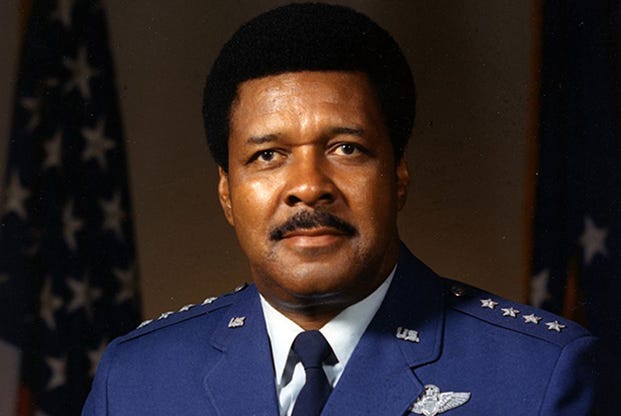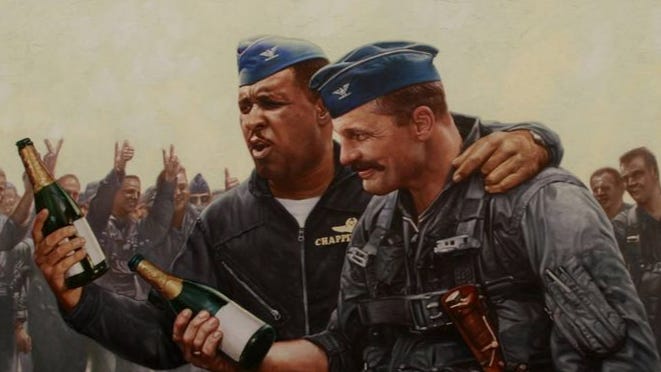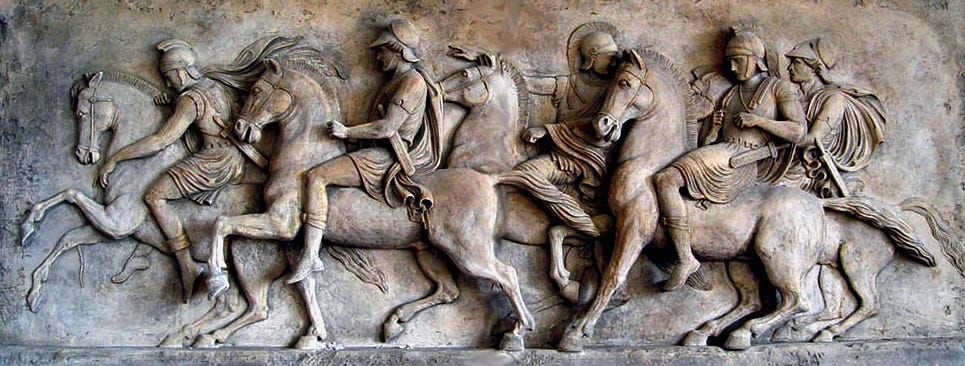There seems to be confusion about the meaning of the word “meritocracy” recently.
I thought it might be useful to clear it up with some straight talk from someone who knows what he’s talking about.
Let me introduce him first.
Gen. Daniel “Chappie” James provided, supported, and multiplied America’s aerial lethality for 35 years as an elite pilot, advisor, and commander at multiple levels. His existence triggered fits of enemy anxiety and dissuaded potential adversaries into anxious hesitation. He was a total badass.
Chappie died on February 25th, 1978, a cruelly brief 24 days after retiring from service.
We normally risk a smidge of hyperbole with the phrase “gave his whole life to service.” In Chappie’s case, it’s on target. Like the ordnance he slung habitually from the rails of fighters in Korea and Vietnam, earning three Distinguished Flying Crosses and 13 Air Medals across 179 combat missions.
James partnered with his boss and partner, the legendary Robin Olds, to devise and lead Operational Bolo, the most successful and storied aerial mission of the Vietnam War. The duo hatched an ingenious plan to make their F-4 Phanton IIs mimic slower, bomb-laden F-105s.
This tactic successfully baited North Vietnamese air defenses into a sustained dogfight placing their fuel-constrained MiG-21s at a disadvantage. Bolo engaged 11 MiGs, turning seven into smoking shrapnel, the momentary flames of vaporizing jet fuel licking defunct metal before scattering it Earthward.
Chappie launched his career as an instructor pilot for the Tuskegee Airmen and ended it as the 4-star commander of NORAD at the height of the Cold War, ascending rapidly through the ranks after his operational acumen and sterling leadership made him a hot post-Vietnam commodity.
You can read more about Chappie’s life story in any dictionary next to the words service, devotion, and duty.
If you already dabble in the lore of heroic airmen, you’ll know Chappie exemplified the same characteristics as his battle buddy Olds, America’s definitively iconic fighter pilot.
Olds is commonly credited with modeling the boldness, on-the-hoof ingenuity, and principled belligerence we recognize as comprising the soul of airpower. His fighting spirit continues rippling through the hearts of today’s airmen, despite the blue bureaucracy long ago disfavoring it as a cultural defect and barrier to assimilation.
Chappie brought these same qualities. He also had Olds’ gift for blunt honesty and moral courage. Olds hired Chappie to be his deputy precisely because he know James had mastered two key phrases: “I disagree,” and “you’re wrong.”
The two were not just partners in crime, but sources of mutual support and inspiration. They etched their names into combat history together. Olds made no secret of his reverence for James, and credited him with being the best fighter pilot he’d ever observed.
Which is like Chuck Norris admiring someone else’s nunchucks.
In 1987, President Reagan dedicated a center of excellence in James’ name at the Tuskegee Institute. He noted how all of America and indeed all of NATO had depended upon James’ judgement and courage for survival in the face of the nuclear threat.
“He had four stars on his shoulder and fifty stars in his heart,” Reagan said.
Oh yeah, something else. James also happened to be the first black airman to achieve four stars. You can find out more about that with a simple google search, though some pages of this airman’s history have been deleted in the recent struggle with blinding stupidity under the “anti-woke” label.
I can’t help digressing here for just a tick.
It’s disgusting that anyone would believe anyone has the requisite fingers to edit this hero’s story. It makes me ashamed to share a uniform with whoever did it, whoever authorized it, whoever has failed to undo it, and the current four-star “leader” of the Air Force who has stood in cowardly silence imitating a house plant while stories like this one have been deleted.
But it’s what we’ve come to expect from Gen. Dave Allvin, whose main example to the Air Force is how to sin yourself into irrelevance through deafening silence.
Gen. Daniel James did not get his stars because he was black, a fact he makes crystalline in the interview I’ve clipped below.
As you absorb this, imagine being the interviewer. Imagine your pulse and pucker factor jumping off the charts as seething menace bubbles from a clearly incensed killer with seldom survived cross-hairs.
We feel the presence that made Chappie legendary. His governed fury like chambered violence, hammer cocked, waiting for an enemy to give him a reason. James was lethality personified.
No rational adversary, communist or otherwise, would dare test him.
I dare say if he were still alive today, we might be having different defense conversations at different levels of candor. We’d probably be talking less about distracting bullshit and more about cattle-prodding bureaucrats into doing their jobs until American military dominance could once again scare enemies into self-pissing retreat.
I don’t share this to start a conversation about the sadness of a black man having to justify himself in the face of a racist premise in America, the land of equality, in 1975.
Nor to lament how Chappie might react if he were alive to see how little things have changed in 50 years.
That is a conversation for another time, and not one best led by me.
I share this for its clarity. If you understand his words, you understand meritocracy.
Chappie was promoted because he was the best. He knows it. He’s confident in it. His organization has given him that confidence with its prior actions, policies, and culture.
Such clarity is hard to come by these days. Chappie’s version of the Air Force is long dead. Confidence in the merit basis of promotions has been damaged. Over-emphasis on immutable characteristics is the commonly cited reason for this, and it’s not wrong.
But it’s not the whole story. There’s also been an under-emphasis on performance, execution, fundamentals, and training. It’s been worsening for generations, displaced by obsession with budgets and political fads and other bullshit.
Before woke controversy pulled the military services into a broader culture war trying its best to crapify every molecule of American life, airmen had already concluded that promotions were not about being the best, but playing the best game. Especially at senior levels.
Chappie’s old words give us a fresh decoder wheel for navigating out of this confusing shit storm. We just need to go back to first principles.
He’s bottom-lining those principles for us by his explicit words and what they imply.
Promoting someone based on immutable characteristics is wrong.
Not promoting based on immutable characteristics is wrong.
Questioning whether someone was promoted based on immutable characteristics is wrong. It’s also deeply insulting. Pose this question to the wrong person at the wrong moment and you could get a good old time ass kicking.
What keeps people from asking such a question, and risking a schoolyard beating, is confidence in the promotion system. Organizations and their leaders are responsible to safeguard that confidence.
Notice this is a lot simpler than bureaucrats and politicians make it. I suspect they’d like to keep it broken and controversial enough to keep us divided and pissed off. Our distraction affords them ample time for various games of mutual grabass between bouts of snatching more cash from taxpayer wallets in exchange for less defense.
But it really is as simple as Chappie makes it. Which is: don’t promote based on anything other than character and performance.
Don’t add criteria that can be twisted into false justifications. Vagaries like “potential” can be stretched to mean anything. Soon they become girthy loopholes used to promote based on what is politically favored. This corrodes confidence.
Don’t add criteria that dilute the value placed on character and performance. The more complex you make a promotion system, the more it can be exploited by the unprincipled and the weak. They become great at peripheral rubbish to compensate for not being the best at what matters. We end up with decent project managers or financiers sitting in chairs meant for leaders. Ascending via shrewd exploitation of an ornate game, they are predictably manipulative and duplicitous as senior officials. They then steer the organization into the ditch.
No matter what, don’t raise or allow to be raised the specter of positive discrimination based on immutable characteristics. This is lethal to trust in the system. It nullifies any sense of fairness. Because no one can change immutable characteristics, which means they cannot self-determine, no matter how hard they work or how superbly they perform.
I anticipate two critiques.
Voices from one “side” will tell me we need to proactively increase the presence of representatives from historically under-represented groups. Because diverse organizations perform better, and inclusive teams have higher morale and retention.
And I will respond that the way we do that can’t be with brute force quotas or with more insidious “shaping tactics” that create relative differences of opportunity to manufacture outcomes.
Because running a promotion system based on anything other than character and performance is like running a prize raffle where the winning tickets are pre-marked and deliberately drawn. Which means the prizes are all turds, no matter how much silver spray paint is wasted trying to disguise them. Because the authority and respect gained in a promotion are derived from the consent of those governed by the system in which it resides. They will revoke consent when they believe promotions are rigged. Resentment and resistance will follow.
Winners will win something not worth having, destroying many good things in the process. As the problem becomes more noticeable, it tempts opportunists to wield it as a serrated cudgel to clobber opponents and further shred the fabric holding our teams together.
Voices from the other “side” will pretend the concepts of diversity and inclusion are nullified by prior over-focus on them. They’ll pretend remediating heartburn requires a self-performed institutional skullectomy. They’ll engage in stunt firings, ignoring the factually demonstrable merit of those shit-canned as necessary to advance their argument.
This is classic utilitarianism and totally antithetical to the concept of individual merit. As is attempting the erasure of history via the digital equivalent of a book barbecue.
All of which is dishonest or dumb, or both.
The antidote to obsession over immutable characteristics isn’t reverse obsession or selective obsession. It’s to stop obsessing altogether. Acknowledge that diversity and inclusiveness are important concepts, and that the way to achieve them is by building amazing organizations that attract and retain elite performers with impeccable character.
Chappie James has told us that’s what it takes, and all it takes, to define meritocracy. He was confident none of his promotions were handouts. So were his teammates.
How do we get back to a place where we can believe that again?
Simple. We need the alleged adults to stop treating this issue like a football to be ritualistically accosted by a pack of misbehaving monkeys. No more stunts or counter-stunts. No more purges or post-electoral score settling. No more adoptive victimization over mainly imagined sins. The energy saved by politicians staying outside the operational perimeter could light the world for a month.
Or pay for a single F-47 when it rolls off the line in 2050.
Before invention of the stirrup, riders either leapt aboard horses or trained them to kneel for mounting. Roman officers selecting legionnaires for the cavalry didn’t care about skin color, native language, social status, or geographical origin in a candidate. They couldn’t afford to care if they wanted to win. It was all a matter of who was a proficient horseman.
Military service has traditionally held itself superior to society in this way. The focus is on what works, and nothing else. Indoctrination melts social barriers, making teams cohesive regardless of differences in experience, culture, wealth, ethnicity, religious belief, and overall worldview.
Military teams learn the magic of pooling these differences to forge the best ideas and tactics to wield against a common enemy. Wielding them against one another breaks the team. Anyone who doesn’t get that is not long for the military world.
Because of the massive authority wielded by leaders, the loudest signal sent in any organization is promotion. Who gets more responsibility, status, compensation, and access to decision making is a powerful and typically dominant preoccupation.
We typically refer to promotion as a carrot, dangled just far enough out of reach to keep its salivating suitor desperate to chug as hard as they can, giving all they’ve got, running their lungs empty to prove they deserve it.
But it’s more than a carrot. It’s more like a platinum-plated, carrot-shaped talisman dangling from a gold chain. Radiating with validation. Pulsating with achievement. Shining brilliantly enough to reflect a future legacy wistfully gazed upon as we regale our grandchildren with tales of challenges met and competitors bested.
Who we promote feeds judgments and shapes attitudes. Which is why it’s absolutely critical we promote based on the right criteria.
Because this is one element of organizational life where we can dissolve moral ambiguity. There are right reasons to promote someone. Any other reason is a wrong reason. There are no neutral reasons.
Moreover, promotions based on wrong reasons are not neutral or harmless in their impact. They are toxic and corrosive to the fabric binding an organization together. Getting them wrong doesn’t just mildly irritate teams. It kills organizational credibility, which inhibits and trust and confidence holding everyone together in a shared endeavor.
Now, a disclaimer.
Nothing I’ve said is scripture. These are propositions. They are well supported by evidence, which I will leave for academics who write important words typically consumed by narrow audiences and otherwise ignored in favor of bias-confirming entertainment.
But I am confident, based on the tightly lashed fury and sneering defiance triggered by any suggestion to the contrary, that Chappie James would agree with my bottom line on promotions if he were still alive today.
Promotions must be about (a) character, and (b) performance.
Nothing else.
Not “cultural fit” or personality.
Not whether someone plays golf or doesn’t. Drinks bourbon or doesn’t.
Not someone’s private sexual behavior.
Not whether they are handsome, gorgeous, nondescript, or a gargoyle.
Not because they might leave or complain if passed over.
Not because of demography, or to assure representation of particular groups.
Not because certain among us need our heroes too.
Not because they are “a good guy” or the favorite of someone powerful.
Not because they have had the right jobs or went to Harvard, or didn’t.
Not because they have the right surname.
And definitely not because they “played the game” better than others.
These are various things which may or may not be also true about someone who is selected for promotion. But that promotion must absolutely be based on character, performance, and nothing else.
When you promote, you create winners and losers. How winners win becomes everyone else’s blueprint. If you promote on character and performance, you’ll get more. If you promote sociopaths, pragmatists, cynics, and backstabbers, you’ll get more.
When you promote someone, you create a mobile beacon. What they transmit will define the culture of your organization wherever they walk and talk. If you promote clowns, you’ll create a circus.
Of all mistakes conceivable in running a promotion system, the most damaging is a stacked deck, real or perceived. The idea you never had a chance because an outcome was predetermined feels unjust. Injustice is powerful because it includes impunity. Those with power do as they can, those without it suffer as they must. The resulting feeling of powerlessness won’t keep. Human nature dictates that powerless people will do whatever is necessary to feel powerful again.
Which is why bad promotion systems trigger resistance and attrition. They usher in mediocrity, hard-cap organizational potential, and waste energy.
Promote the wrong people for long enough and you can lose any basis in character and performance altogether. The result is a lack of principle in key decisions, leading to myopia-driven tailspinning with no genuine leader within reach of the controls to stabilize things.
Total collapse follows.
Take a look at today’s Air Force and see if you can develop any evidence that collapse is not happening.
Conclusion
These days, factional trolls, insecure bullies, and toadie shitbags have hijacked the terms “diversity” and “meritocracy,” framing them as mutually exclusive.
Chappie James proved the opposite.
He earned his stars and his respect. They didn’t give him anything.
And by virtue of his unique experiences and uncommon journey, he also happened to diversify the Air Force’s leadership team. His perspective and reasoning were unique, enhancing creativity and problem solving. He helped the Air Force instigate recovery from its hollowed-out post-Vietnam low point, and was entrusted with America’s air defenses at the height of a nuclear-tipped Cold War.
But the defiance we glimpse in James’s seething response to doubts about his four-star status sprung from his confidence in the Air Force’s promotion system. A confidence shared by most airmen for most of the service’s history.
I once heard another blue-suited legend answer a question about promotion, and his answer has stuck with me for three decades.
Chuck Yeager was asked by an audience member for advice on how to stay true to yourself and still be promotable. In characteristically terse and salty lingo, he danced the edge of appropriateness just as he’d danced the boundaries of physics so many times before.
“Be so good at what you do that nothing else matters. Be trustworthy enough that your boss trusts you alone with his wife. Let the system to do the rest.”
Character and performance. Nothing else.
It was for a long time the case that if you followed this advice, you could win. Through various methods of dilution at different points in time, it became less the case. These days, it doesn’t seem to be the case at all anymore.
That’s what needs to change.
Instead of firing people for fun and sport bitching his way through influencer videos, I’d like to see the Secretary of Defense implement actual policy to restore faith in the promotion system.
Sure, it’ll take more than a memo. It’ll mean collaborating with legislative staffs, crafting proposed legislation, and influencing stakeholders to produce a binding result.
But the juice is worth the squeeze. Because we need different generals.
Chappie James was a replete ninja capable of melting enemy resolve in a single glance and boiling minute rice in 58 seconds.
Indeed, his insight and force of personality were so seismic that he continues to have the best grip on reality despite being dead for half a century. Or, to state it another way, our current leadership is collectively dumber than a cold pile of bones.
The magic of documented history gives Chappie immortality. He can be among us even though he isn’t with us. Thank God for that.
It also gives us the ability to observe the walking, talking definition of merit. And in doing so, to cut away the useless ballast holding us back. We can get moving forward again, unified.
If Gen. James were alive today, he’d tell us we can only fly, fight, and win if we work hard for it. No one is going to give us anything. Victory is not an American birth right. It’s something we have to make.
Best we get throttle in hand and get after it.
Tony is a retired Air Force officer and independent voice on leadership, organizations, operations, and defense.












If there were a global syllabus for leadership, this would be on it.
American Leadership Legend! I’ve always wanted to know if his comment about the Marine Corps is authentic or apocryphal.